PEP小学英语四种时态练习题及答案培训讲学
- 格式:doc
- 大小:49.00 KB
- 文档页数:8
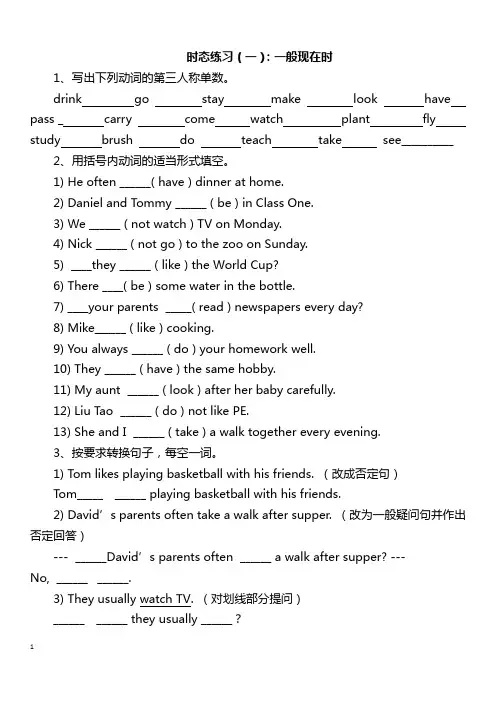
时态练习(一):一般现在时1、写出下列动词的第三人称单数。
drink go stay make look have pass _ carry come watch plant fly study brush do teach take see__________2、用括号内动词的适当形式填空。
1) He often ______( have ) dinner at home.2) Daniel and Tommy ______ ( be ) in Class One.3) We ______ ( not watch ) TV on Monday.4) Nick ______ ( not go ) to the zoo on Sunday.5) ____they ______ ( like ) the World Cup?6) There ____( be ) some water in the bottle.7) ____your parents _____( read ) newspapers every day?8) Mike______ ( like ) cooking.9) You always ______ ( do ) your homework well.10) They ______ ( have ) the same hobby.11) My aunt ______ ( look ) after her baby carefully.12) Liu Tao ______ ( do ) not like PE.13) She and I ______ ( take ) a walk together every evening.3、按要求转换句子,每空一词。
1) Tom likes playing basketball with his friends. (改成否定句)Tom_____ ______ playing basketball with his friends.2) David’s parents often take a walk after supper. (改为一般疑问句并作出否定回答)--- ______David’s parents often ______ a walk after supper? ---No, ______ ______.3) They usually watch TV. (对划线部分提问)______ ______ they usually ______?4)She is always a good student. (改为一般疑问句并作出肯定回答)5)--- ___ ______ always a ______ student? --- ______ , ______ ______ .6)5) Simon and Daniel like going skating. (改为否定句)7)Simon and Daniel ______ ______ going ______.6)Tom does his homework every day.(否定句)Tom_________ ______ his homework every day.7)Alice has got a new comic book as her birthday present.(改为一般疑问句并肯定回答)_________ Alice___________ a new comic book as her birthday presentYes, _______ _________.时态练习(二):一般将来时一、用所给动词的正确形式填空。
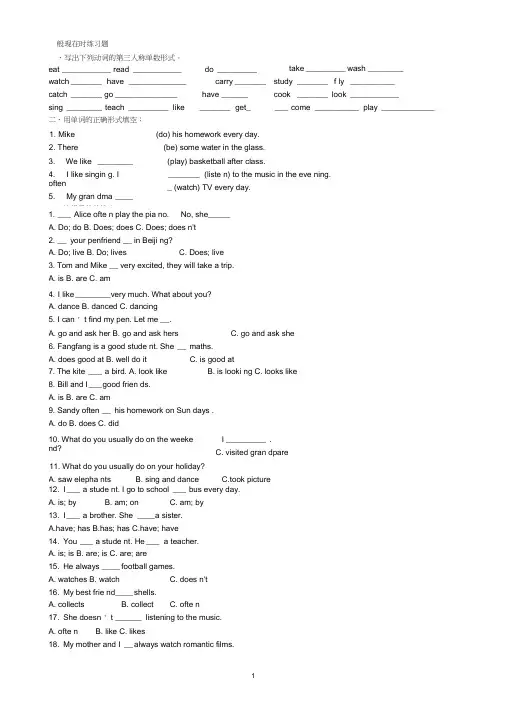
般现在时练习题、写出下列动词的第三人称单数形式。
12. I ___ a stude nt. I go to school ___ bus every day. A. is; byB. am; onC. am; by13. I ___ a brother. She ____a sister. A.have; has B.has; has C.have; have 14. You ___ a stude nt. He ___ a teacher. A. is; is B. are; is C. are; are 15. He always ____ football games. A. watches B. watchC. does n't16. My best frie nd ____ shells. A. collects B. collectC. ofte n17. She doesn ' t ______ listening to the music. A. ofte nB. likeC. likes18. My mother and I __ always watch romantic films.eat ___________ read ___________ watch _______ have _____________ catch _______ go ______________ sing ________ teach _________ like二、用单词的正确形式填空:do _________ carry _______ have ______ _______ get_take _________ wash ________ study _______ f ly __________cook _______ look ___________ ___ come __________ play ____________1. Mike (do) his homework every day.2. There (be) some water in the glass.3.We like ________ 4. I like singin g. I often 5.My gran dma ____三、选择最佳的答案:(play) basketball after class._______ (liste n) to the music in the eve ning. _ (watch) TV every day.1. ___ Alice ofte n play the pia no. No, she _____A. Do; doB. Does; doesC. Does; does n't2. __ your penfriend __ in Beiji ng? A. Do; live B. Do; lives C. Does; live3. Tom and Mike __ very excited, they will take a trip.A. isB. areC. am4. I like ________very much. What about you? A. dance B. danced C. dancing5. I can ' t find my pen. Let me __. A. go and ask her B. go and ask hersC. go and ask she6. Fangfang is a good stude nt. She __ maths. A. does good at B. well do it C. is good at7. The kite ___ a bird. A. look like B. is looki ng C. looks like8. Bill and I ___ g ood frien ds. A. is B. are C. am9. Sandy often __ his homework on Sun days . A. do B. does C. did10. What do you usually do on the weekend?A. went swimmi ngB. go swimmi ng I _________ .C. visited gran dpare nts11. What do you usually do on your holiday?A. saw elepha ntsB. sing and danceC.took pictureA. doesn ' tB. don ' tC. do 19. ---When ____ he get home on Friday? ----He gets home at four on Friday. A. do B. does C. did现在进行时练习题 一、 写出下列单词的现在分词: do ________ play ___________ danc ____________ sit ______________ make ___________ swim __________ jump __________ cook _____________ clean __________ watch ___________ come _________ read _____________ eat ___________ write ____________ sing ___________ go _____________ run __________ fly ____________ catch _________ help ____________ 二、用单词的适当形式填空: 1. look! Chen Jie and Mike are __________ (sing )now. 2. The small bear is _______ (climb) the tree. 3. Mike is _______ (draw) picture. 4. She is ________ (do) the dishes. 5. My brother is _______ (make) kites. 6. My father is _______ (read) a n ewspaper in living room. 7. Ted is __________ (an swer) the phone. 8. My un cle is _______ (drive) a car. 9. The stude nts are _______ (liste n) to their teacher carefully. 10. Che n Jie is ________ (wash) clothes. 三、选择正确答案 1. Every one ___ to their teacher in the classroom. A. are liste ningB. is liste ningC. listen 2. They are singing and ___ t ogether at the party now. A. dance B. danced C. dancing 3. Liste n! The birds . A. is si ngingB. are singC. are singing 4. Look! The kite __ in the sky. A. fly B. flies C. is flyi ng5. They ____ riding a forse. A. is6. Kate ____ p layi ng chess. A. am7. Are you washing clothes ? A. Yes, you are B. Yes, I am B. are C. am B. is C. are C. No, I am8. Is he ____ TV ? Yes, he is. A. watch B. watch ing C. not9. ___ they tak ing pictures.? Yes, they are. A. Am B. Be C. Are 10. It s 10 o ' clock. Ben ______ TV in the bedroom. A. watch B. is watch ing C. watches 四、根据中文填空。
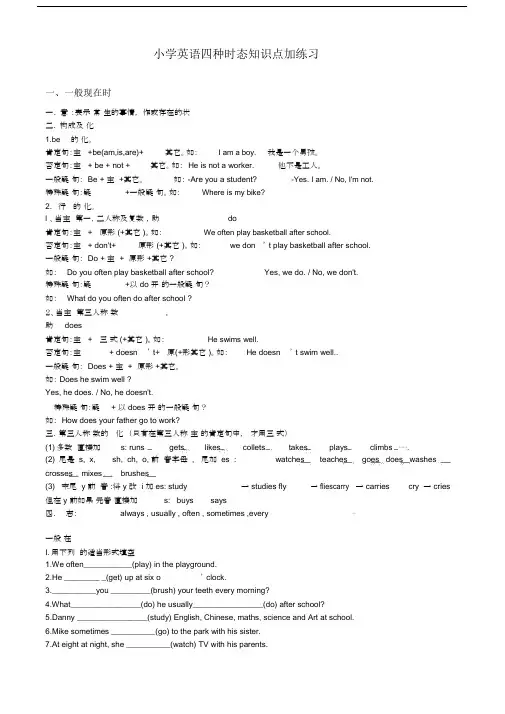
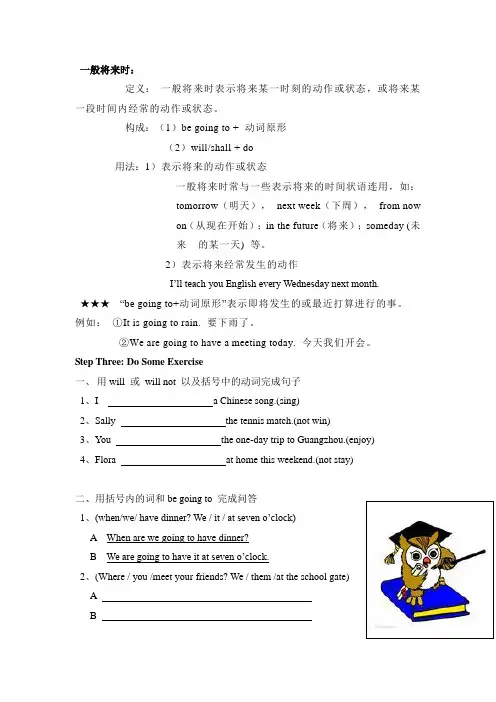
一般将来时:定义:一般将来时表示将来某一时刻的动作或状态,或将来某一段时间内经常的动作或状态。
构成:(1)be going to + 动词原形(2)will/shall + do用法:1)表示将来的动作或状态一般将来时常与一些表示将来的时间状语连用,如:tomorrow(明天),next week(下周),from nowon(从现在开始);in the future(将来);someday (未来的某一天) 等。
2)表示将来经常发生的动作I’ll teach you English every Wednesday next month.★★★“be going to+动词原形”表示即将发生的或最近打算进行的事。
例如:①It is going to rain. 要下雨了。
②We are going to have a meeting today. 今天我们开会。
Step Three: Do Some Exercise一、用will 或will not 以及括号中的动词完成句子1、I a Chinese song.(sing)2、Sally the tennis match.(not win)3、You the one-day trip to Guangzhou.(enjoy)4、Flora at home this weekend.(not stay)二、用括号内的词和be going to 完成问答1、(when/we/ have dinner? We / it / at seven o’clock)A When are we going to have dinner?B We are going to have it at seven o’clock.2、(Where / you /meet your friends? We / them /at the school gate)AB3、(you and Ling / play football/ today? No / we/ table tennis)AB现在进行时be+动词ing。
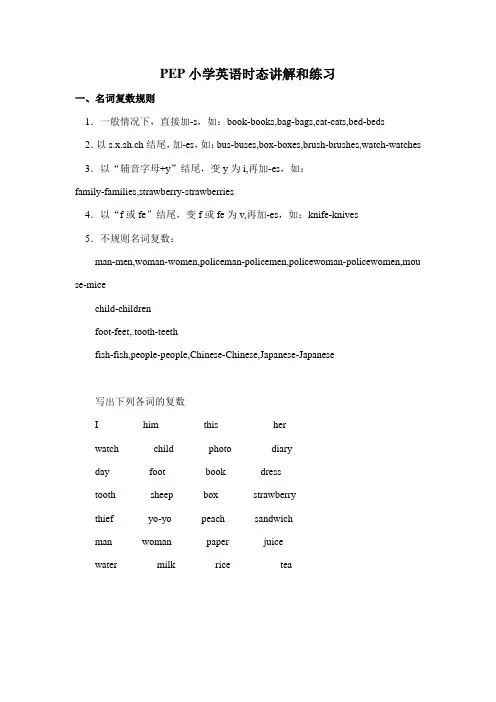
PEP小学英语时态讲解和练习一、名词复数规则1.一般情况下,直接加-s,如:book-books,bag-bags,cat-cats,bed-beds2.以s.x.sh.ch结尾,加-es,如:bus-buses,box-boxes,brush-brushes,watch-watches 3.以“辅音字母+y”结尾,变y为i,再加-es,如:family-families,strawberry-strawberries4.以“f或fe”结尾,变f或fe为v,再加-es,如:knife-knives5.不规则名词复数:man-men,woman-women,policeman-policemen,policewoman-policewomen,mou se-micechild-childrenfoot-feet,.tooth-teethfish-fish,people-people,Chinese-Chinese,Japanese-Japanese写出下列各词的复数I_________him_________this___________her______watch_______child_______photo________diary______day________foot________book_______dress________tooth_______sheep______box_______strawberry_____thief_______yo-yo______peach______sandwich______man______woman_______paper_______juice___________water________milk________rice__________tea__________二、一般现在时一般现在时基本用法介绍【No.1】一般现在时的功能1.表示事物或人物的特征、状态。
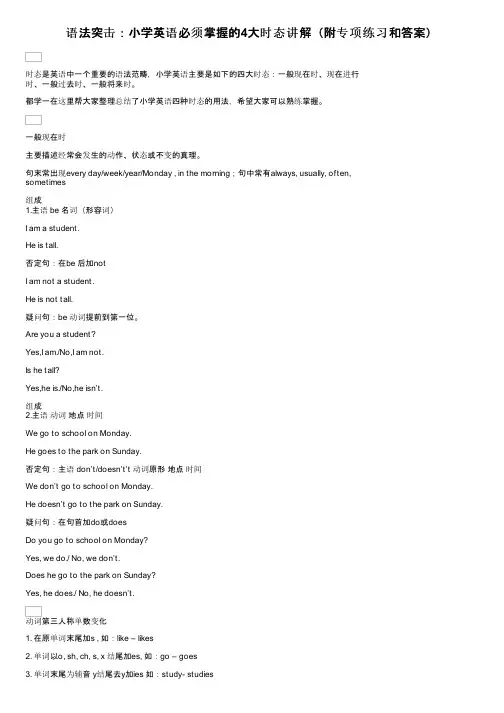
语法突击:小学英语必须掌握的4大时态讲解(附专项练习和答案)时态是英语中一个重要的语法范畴,小学英语主要是如下的四大时态:一般现在时、现在进行时、一般过去时、一般将来时。
都学一在这里帮大家整理总结了小学英语四种时态的用法,希望大家可以熟练掌握。
一般现在时主要描述经常会发生的动作、状态或不变的真理。
句末常出现every day/week/year/Monday , in the morning;句中常有always, usually, often,sometimes组成1.主语 be 名词(形容词)I am a student.He is tall.否定句:在be 后加notI am not a student.He is not tall.疑问句:be 动词提前到第一位。
Are you a student?Yes,I am./No,I am not.Is he tall?Yes,he is./No,he isn’t.组成2.主语动词地点时间We go to school on Monday.He goes to the park on Sunday.否定句:主语 don’t/doesn’t’t 动词原形地点时间We don’t go to school on Monday.He doesn’t go to the park on Sunday.疑问句:在句首加do或doesDo you go to school on Monday?Yes, we do./ No, we don’t.Does he go to the park on Sunday?Yes, he does./ No, he doesn’t.动词第三人称单数变化1. 在原单词末尾加s , 如:like – likes2. 单词以o, sh, ch, s, x 结尾加es, 如:go – goes3. 单词末尾为辅音 y结尾去y加ies 如:study- studies现在进行时主要叙述正在发生的事情。
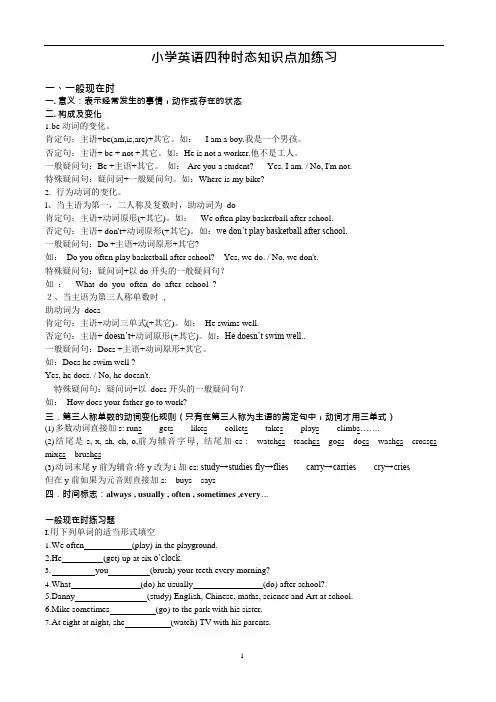
小学英语四种时态知识点加练习一、一般现在时一. 意义:表示经常发生的事情,动作或存在的状态二. 构成及变化1.b e 动词的变化。
肯定句:主语+be(am,is,are)+其它。
如:I am a boy.我是一个男孩。
否定句:主语+ be + not +其它。
如:He is not a worker.他不是工人。
一般疑问句:Be +主语+其它。
如:-Are you a student? -Yes. I am. / No, I'm not.特殊疑问句:疑问词+一般疑问句。
如:Where is my bike?2.行为动词的变化。
l、当主语为第一,二人称及复数时,助动词为do肯定句:主语+动词原形(+其它)。
如:We often play basketball after school.否定句:主语+ don't+动词原形(+其它)。
如:we don’t play basketball after school.一般疑问句:Do +主语+动词原形+其它?如:Do you often play basketball after school? Yes, we do. / No, we don't.特殊疑问句:疑问词+以do 开头的一般疑问句?如:What do you often do after school ?2、当主语为第三人称单数时,助动词为does肯定句:主语+动词三单式(+其它)。
如:He swims well.否定句:主语+ doesn’t+动词原形(+其它)。
如:He doesn’t swim well..一般疑问句:Does +主语+动词原形+其它。
如:Does he swim well ?Yes, he does. / No, he doesn't.特殊疑问句:疑问词+以does 开头的一般疑问句?如:How does your father go to work?三.第三人称单数的动词变化规则(只有在第三人称为主语的肯定句中,动词才用三单式)(1)多数动词直接加s: runs gets likes collets takes plays climbs…….(2)结尾是s, x, sh, ch, o,前为辅音字母, 结尾加es : watches teaches goes does washes crosses mixes brushes(3)动词末尾y 前为辅音:将y 改为i 加es: study→studies fly→flies carry→carries cry→cries但在y 前如果为元音则直接加s: buys says四.时间标志:always , usually , often , sometimes ,every…一般现在时练习题I.用下列单词的适当形式填空1.We often (play) in the playground.2.He (get) up at six o’clock.3.you (brush) your teeth every morning?4.What (do) he usually (do) after school?5.Danny (study) English, Chinese, maths, science and Art at school.6.Mike sometimes (go) to the park with his sister.7.A t eight at night, she (watch) TV with his parents.8.Mike (read) English every day?9.How many lessons your classmates (have) on Monday?10.What time his mother (do) the housework?II.改句子1.D o you often play football after school? (改为肯定句)2.I have many books.(改为否定句)3.G ao Shan’s sister likes playing table tennis (改为否定句)4.S he lives in a small town near New York.(改为一般疑问句)5.I watch TV every day.(改为一般疑问句)6.We have four lessons.(改为否定句)7.Nancy doesn’t run fast (改为肯定句)二、现在进行时一、概念现在进行时表示说话时正在进行或发生的动作,也可表示当前一段时间内的活动或现阶段正在进行的动作。
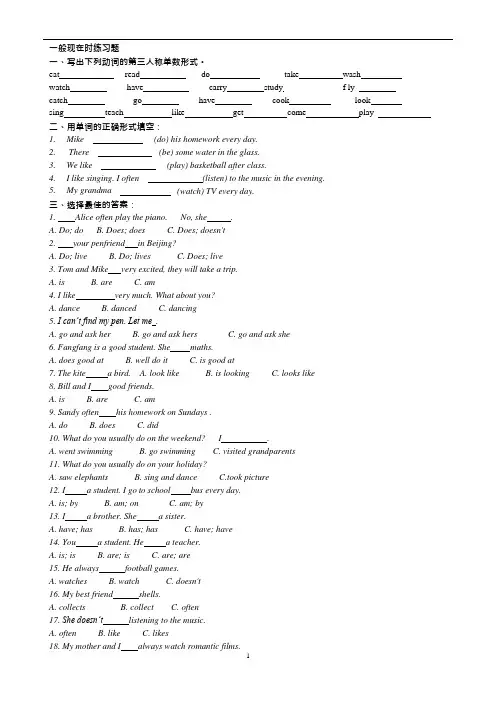
一般现在时练习题一、写出下列动词的第三人称单数形式。
eat read do take wash watch have carry study f ly catch go have cook look sing teach like get come play 二、用单词的正确形式填空:1.Mike2.There (do) his homework every day. (be) some water in the glass.3.We like (play) basketball after class.4.I like singing. I often (listen) to the music in the evening.5.My grandma三、选择最佳的答案:(watch) TV every day.1.Alice often play the piano. No, she .A.Do; doB. Does; doesC. Does; doesn't2.your penfriend in Beijing?A.Do; liveB. Do; livesC. Does; live3.Tom and Mike very excited, they will take a trip.A.isB. areC. am4.I like very much. What about you?A.danceB. dancedC. dancing5.I can’t find my pen. Let me .A.go and ask herB. go and ask hersC. go and ask she6.Fangfang is a good student. She maths.A.does good atB. well do itC. is good at7.The kite a bird. A. look like B. is looking C. looks like8.Bill and I good friends.A.isB. areC. am9.Sandy often his homework on Sundays .A.doB. doesC. did10.What do you usually do on the weekend? I .A. went swimmingB. go swimmingC. visited grandparents11.What do you usually do on your holiday?A. saw elephantsB. sing and danceC.took picture12.I a student. I go to school bus every day.A. is; byB. am; onC. am; by13.I a brother. She a sister.A. have; hasB. has; hasC. have; have14.You a student. He a teacher.A. is; isB. are; isC. are; are15.He always football games.A. watchesB. watchC. doesn't16.My best friend shells.A. collectsB. collectC. often17.She doesn’t listening to the music.A. oftenB. likeC. likes18.My mother and I always watch romantic films.A. doesn’tB. don’tC. do19.---When he get home on Friday?----He gets home at four on Friday. A. do B. does C. did现在进行时练习题一、写出下列单词的现在分词:do play dance sitmake swim jump cookclean watch come readeat write sing gorun fly catch help二、用单词的适当形式填空:1.look! Chen Jie and Mike are (sing)now.2.The small bear is (climb) the tree.3.Mike is (draw) picture.4.She is (do) the dishes.5.My brother is (make) kites.6.My father is (read) a newspaper in living room.7.Ted is (answer) the phone.8.My uncle is (drive) a car.9.The students are (listen) to their teacher carefully.10.Chen Jie is (wash) clothes.三、选择正确答案1.Every one to their teacher in the classroom.A.are listeningB. is listeningC. listen2.They are singing and together at the party now.A.danceB. dancedC. dancing3.Listen! The birds .A.is singingB. are singC. are singing4.Look! The kite in the sky. A. fly B. flies C. is flying5.They riding a forse. A. is B. are C. am6.Kate playing chess. A. am B. is C. are7.Are you washing clothes?A.Yes, you areB. Yes, I amC. No, I am8.Is he TV?Yes, he is. A. watch B. watching C. not9.they taking pictures.? Yes, they are.A.AmB. BeC. Are10.It’s 10o’clock. Ben TV in the bedroom.A. watchB. is watchingC. watches四、根据中文填空。
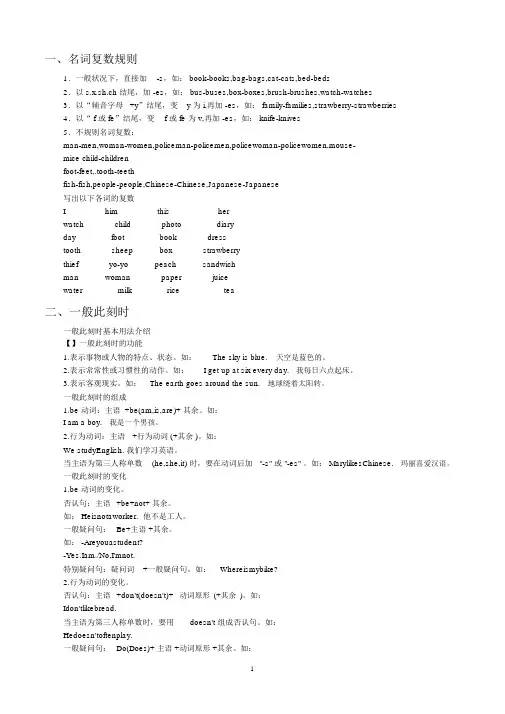
一、名词复数规则1.一般状况下,直接加-s,如: book-books,bag-bags,cat-cats,bed-beds2.以 s.x.sh.ch 结尾,加 -es,如: bus-buses,box-boxes,brush-brushes,watch-watches3.以“辅音字母+y”结尾,变y 为 i,再加 -es,如: family-families,strawberry-strawberries4.以“ f 或 fe”结尾,变 f 或 fe 为 v,再加 -es,如: knife-knives5.不规则名词复数:man-men,woman-women,policeman-policemen,policewoman-policewomen,mouse-mice child-childrenfoot-feet,.tooth-teethfish-fish,people-people,Chinese-Chinese,Japanese-Japanese写出以下各词的复数I_________him_________this___________her______watch_______child_______photo________diary______day________foot________book_______dress________tooth_______sheep______box_______strawberry_____thief_______yo-yo______peach______sandwich______man______woman_______paper_______juice___________water________milk________rice__________tea__________二、一般此刻时一般此刻时基本用法介绍【】一般此刻时的功能1.表示事物或人物的特点、状态。
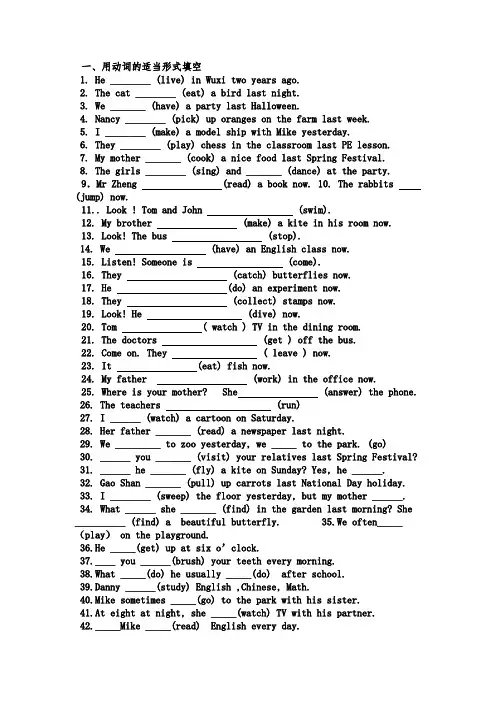
一、用动词的适当形式填空1. He ________ (live) in Wuxi two years ago.2. The cat ________ (eat) a bird last night.3. We _______ (have) a party last Halloween.4. Nancy ________ (pick) up oranges on the farm last week.5. I ________ (make) a model ship with Mike yesterday.6. They ________ (play) chess in the classroom last PE lesson.7. My mother _______ (cook) a nice food last Spring Festival.8. The girls ________ (sing) and _______ (dance) at the party.9.Mr Zheng (read) a book now. 10. The rabbits (jump) now.11.. Look ! Tom and John (swim).12. My brother (make) a kite in his room now.13. Look! The bus (stop).14. We (have) an English class now.15. Listen! Someone is (come).16. They (catch) butterflies now.17. He (do) an experiment now.18. They (collect) stamps now.19. Look! He (dive) now.20. Tom ( watch ) TV in the dining room.21. The doctors (get ) off the bus.22. Come on. They ( leave ) now.23. It (eat) fish now.24. My father (work) in the office now.25. Where is your mother? She (answer) the phone.26. The teachers (run)27. I ______ (watch) a cartoon on Saturday.28. Her father _______ (read) a newspaper last night.29. We _________ to zoo yesterday, we _____ to the park. (go)30. ______ you _______ (visit) your relatives last Spring Festival?31. ______ he _______ (fly) a kite on Sunday? Yes, he ______.32. Gao Shan _______ (pull) up carrots last National Day holiday.33. I ________ (sweep) the floor yesterday, but my mother ______.34. What ______ she _______ (find) in the garden last morning? She__________ (find) a beautiful butterfly. 35.We often_____(play) on the playground.36.He _____(get) up at six o’clock.37.____ you ______(brush) your teeth every morning.38.What _____(do) he usually _____(do) after school.39.Danny ______(study) English ,Chinese, Math.40.Mike sometimes _____(go) to the park with his sister.41.At eight at night, she _____(watch) TV with his partner.42._____Mike _____(read) English every day.43.How many leseons _____your classmate _____(have) on Monday.44.What time _____his mother _____(do) the housework.一、用be动词的适当形式填空1. I _______ at school just now.2. He ________ at the camp last week.3.We ________ students two years ago.4.They ________ on the farm a moment ago.5.Yang Ling ________ eleven years old last year.6.There ________ an apple on the plate yesterday.7. There ________ some milk in the fridge on Sunday.8.The mobile phone _____ on the sofa yesterday evening.9.I ______ an English teacher now.10. She _______ happy yesterday.11.They _______ glad to see each other last month.12.Helen and Nancy ________ good friends.13.The little dog _____ two years old this year.14.Look, there ________ lots of grapes here.15.There ________ a sign on the chair on Monday..16. Today _____ the second of June. Yesterday ______ the first of June. It _____ Children’s Day. All the students ______ very excited.二、填空。
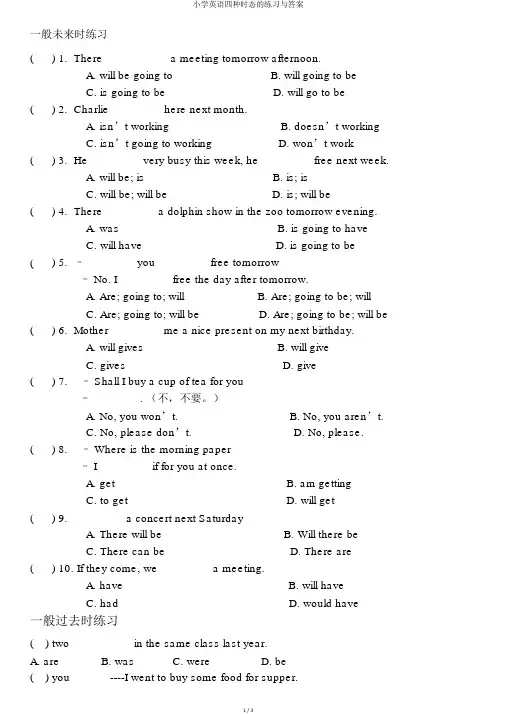
一般未来时练习( ) 1. There __________ a meeting tomorrow afternoon.A. will be going toB. will going to beC. is going to beD. will go to be( ) 2. Charlie ________ here next month.A. isn’t workingB. doesn’t workingC. isn’t going to workingD. won’t work ( ) 3. He ________ very busy this week, he ________ free next week.A. will be; isB. is; isC. will be; will beD. is; will be( ) 4. There ________ a dolphin show in the zoo tomorrow evening.A. wasB. is going to haveC. will haveD. is going to be ( ) 5. –________ you ________ free tomorrow– No. I ________ free the day after tomorrow.A. Are; going to; willB. Are; going to be; willC. Are; going to; will beD. Are; going to be; will be ( ) 6. Mother ________ me a nice present on my next birthday.A. will givesB. will giveC. givesD. give( ) 7. – Shall I buy a cup of tea for you–________. (不,不要。
小学英语四种时态的综合讲解及练习编辑整理:尊敬的读者朋友们:这里是精品文档编辑中心,本文档内容是由我和我的同事精心编辑整理后发布的,发布之前我们对文中内容进行仔细校对,但是难免会有疏漏的地方,但是任然希望(小学英语四种时态的综合讲解及练习)的内容能够给您的工作和学习带来便利。
同时也真诚的希望收到您的建议和反馈,这将是我们进步的源泉,前进的动力。
本文可编辑可修改,如果觉得对您有帮助请收藏以便随时查阅,最后祝您生活愉快业绩进步,以下为小学英语四种时态的综合讲解及练习的全部内容。
一般将来时:定义: 一般将来时表示将来某一时刻的动作或状态,或将来某一段时间内经常的动作或状态。
构成:(1)be going to + 动词原形(2)will/shall + do用法:1)表示将来的动作或状态一般将来时常与一些表示将来的时间状语连用,如:tomorrow(明天), next week(下周), from nowon(从现在开始);in the future(将来);someday (未来的某一天)等。
2)表示将来经常发生的动作I'll teach you English every Wednesday next month。
★★★“be going to+动词原形"表示即将发生的或最近打算进行的事。
例如: ①It is going to rain. 要下雨了.②We are going to have a meeting today。
今天我们开会。
Step Three: Do Some Exercise一、用will 或 will not 以及括号中的动词完成句子1、I a Chinese song。
(sing)2、Sally the tennis match.(not win)3、You the one—day trip to Guangzhou。
(enjoy)4、Flora at home this weekend。
P E P小学英语四种时态练习题及答案一般现在时练习题一、写出下列动词的第三人称单数形式。
eat read do take washwatch have carry study f lycatch go have cook looksing teach like get come play二、用单词的正确形式填空:1.Mike ___________ (do) his homework every day.2. There ____________ (be) some water in the glass.3.We like ____________ (play) basketball after class.4.I like singing. I often ____________ (listen) to the music in the evening.5.My grandma ___________ (watch) TV every day.三、选择最佳的答案:1. ____Alice often play the piano. No, she _____.A. Do; doB. Does; doesC. Does; doesn't2. ___ your penfriend __ in Beijing?A. Do; liveB. Do; livesC. Does; live3. Tom and Mike __ very excited, they will take a trip.A. isB. areC. am4. I like ________ very much. What about you?A. danceB. dancedC. dancing5. I can’t find my pen. Let me __.A. go and ask herB. go and ask hersC. go and ask she6. Fangfang is a good student. She ____maths.A. does good atB. well do itC. is good at7. The kite ____ a bird. A. look like B. is looking C. looks like8. Bill and I ___ good friends.A. isB. areC. am9. Sandy often ___ his homework on Sundays .A. doB. doesC. did10. What do you usually do on the weekend? I __________.A. went swimmingB. go swimmingC. visited grandparents11. What do you usually do on your holiday?A. saw elephantsB. sing and danceC.took picture12. I ____ a student. I go to school ____bus every day.A. is; byB. am; onC. am; by13. I ____ a brother. She ____ a sister.A. have; hasB. has; hasC. have; have14. You ____ a student. He ____ a teacher.A. is; isB. are; isC. are; are15. He always _____ football games.A. watchesB. watchC. doesn't16. My best friend _____ shells.A. collectsB. collectC. often17. She doesn’t _____ listening to the music.A. oftenB. likeC. likes18. My mother and I ___ always watch romantic films.A. does n’tB. don’tC. do19. ---When _____ he get home on Friday?----He gets home at four on Friday. A. do B. does C. did现在进行时练习题一、写出下列单词的现在分词:do play dance sitmake swim jump cookclean watch come readeat write sing gorun fly catch help二、用单词的适当形式填空:1. look! Chen Jie and Mike are ___________(sing)now.2. The small bear is ________ (climb) the tree.3. Mike is ________ (draw) picture.4. She is ________ (do) the dishes.5. My brother is ________ (make) kites.6. My father is ________ (read) a newspaper in living room.7. Ted is __________(answer) the phone.8. My uncle is ________ (drive) a car.9. The students are ________(listen) to their teacher carefully.10. Chen Jie is _________(wash) clothes.三、选择正确答案1. Every one ____ to their teacher in the classroom.A. are listeningB. is listeningC. listen2. They are singing and ___ together at the party now.A. danceB. dancedC. dancing3. Listen! The birds ____.A. is singingB. are singC. are singing4. Look! The kite ___ in the sky. A. fly B. flies C. is flying5. They ____ riding a forse. A. is B. are C. am6. Kate ____ playing chess. A. am B. is C. are7. Are you washing clothes?A. Yes, you areB. Yes, I amC. No, I am8. Is he ____ TV?Yes, he is. A. watch B. watching C. not9. ____ they taking pictures.? Yes, they are.A. AmB. BeC. Are10. It’s 10 o’clock. Ben _____ TV in the bedroom.A. watchB. is watchingC. watches四、根据中文填空。
1. Sandy 正在弹钢琴。
Sandy ______ ________ the piano.2. 听,她们正在说英语。
Listen, _______ are _______ English.3.我正在做家庭作业。
I _________ _________ my homework.4.她正在写信吗? ________she _______a letter?5. Zhang Peng 和Tom 在树下下棋。
Zhang Peng and Tom ________ ________ chess under the tree. 6. 你们正在植树吗? _______ you ________ trees? Yes, we are. 一般过去时练习题小学阶段不规则动词的过去式整理:am is -----was are-----were begin ----began ride---rode blow----blewbreak----broke bring----brought run---ran build----built buy----boughtcatch---caught say---said come---came see---saw draw---drew drink---drank eat---ate fall----fell drive---drove sing---sang do---did fly----flew sit---sat fight---fought go----went meet---met sweep---swept sleep---slept teach----taught swim---swam take----took leave---left tell—told write---wrote know---knew wear---wore get---got give----gave have---had make----made put---put read---read throw---threw一、写出下列动词的过去式或动词原形。
1.go________2.is________3.buy________4.swim________5.have ________6. watched _________7. ate________8. got________9. lived ________ 10. saw ________ 11. spend ________12. talk ________ 13. do _________ 14. teach ________15. win ________ 16. like _________ 17. write ________18. cry ________ 19. study _________ 20. ask ________二、用单词的适当形式填空。
1. _____ you ______(water) the flowers yesterday?2. Su Hai ________(go) for a walk last Sunday.3. Mike didn’t ________(finish) his homework yesterday.4. I _______ (pick) apples on the tree last month.5. I_______(is) ten years old last year.6. There _______(are) five books on the desk a moment ago.7. They _______(sweep) the floor just now.8. I _______ (meet) Miss White the day before yesterday.10. I _______ (wash) clothes last weekend.11. What did you you do on your holiday?I _______ (go) swimming.三、选择正确的答案。